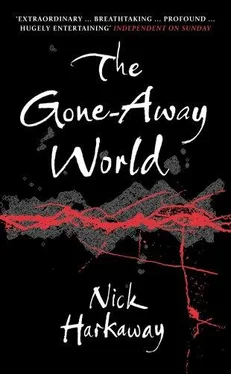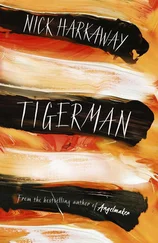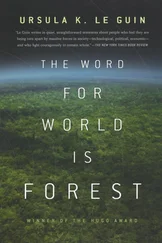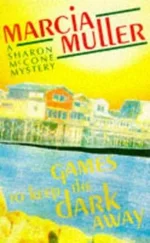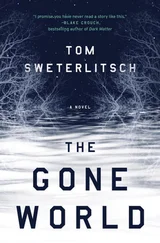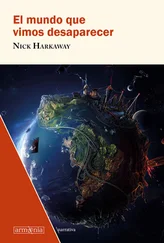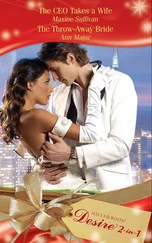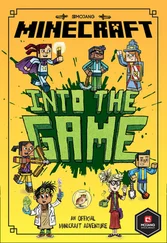Nick Harkaway - The Gone-Away World
Здесь есть возможность читать онлайн «Nick Harkaway - The Gone-Away World» весь текст электронной книги совершенно бесплатно (целиком полную версию без сокращений). В некоторых случаях можно слушать аудио, скачать через торрент в формате fb2 и присутствует краткое содержание. Жанр: Фантастика и фэнтези, Фэнтези, на английском языке. Описание произведения, (предисловие) а так же отзывы посетителей доступны на портале библиотеки ЛибКат.
- Название:The Gone-Away World
- Автор:
- Жанр:
- Год:неизвестен
- ISBN:нет данных
- Рейтинг книги:4 / 5. Голосов: 1
-
Избранное:Добавить в избранное
- Отзывы:
-
Ваша оценка:
- 80
- 1
- 2
- 3
- 4
- 5
The Gone-Away World: краткое содержание, описание и аннотация
Предлагаем к чтению аннотацию, описание, краткое содержание или предисловие (зависит от того, что написал сам автор книги «The Gone-Away World»). Если вы не нашли необходимую информацию о книге — напишите в комментариях, мы постараемся отыскать её.
The Gone-Away World — читать онлайн бесплатно полную книгу (весь текст) целиком
Ниже представлен текст книги, разбитый по страницам. Система сохранения места последней прочитанной страницы, позволяет с удобством читать онлайн бесплатно книгу «The Gone-Away World», без необходимости каждый раз заново искать на чём Вы остановились. Поставьте закладку, и сможете в любой момент перейти на страницу, на которой закончили чтение.
Интервал:
Закладка:
“And the young man was nicknamed Ocean thereafter, and he was still a terrible farmer and very bad dancer, but his father and uncle and his mother and all his family were very proud, and he was content. And the Secret is this . . .”
Master Wu screws up one eye and opens the other very wide. He crooks his hands and lisps. This is presumably an appropriate face for imparting Secrets.
“ In unifying your chi with that of your opponent—in aligning the breath of your life and theirs—you will storm the strongest fortress. There! Is that a good Secret?”
I have no idea. It sounds as if it might be really profound. It also sounds like baloney. It is, therefore, the highest-quality bullshido, or martial arts hogwash. I don’t know whether to commit it to memory and study it or consider it an object lesson in the ease with which you can counterfeit ancient proverbs. Old Man Lubitsch once worked in an auction house in far off New York City, and is very fond of a saying he heard there regarding the provenance of religious iconography from eastern Europe: “Seventeeth century, but the artist is still alive.”
“What does it mean?” Elisabeth says.
“No idea. It’s a Secret. Means what you need it to mean. But now we have one, we can refuse to tell anyone about it!” He laughs. Wu Shenyang of the Voiceless Dragon, making up fairy tales like Lydia Copsen.
And then he puts another record on the gramophone (this one is Ella Fitzgerald, who—according to Master Wu—knew a great deal about chi), and Elisabeth and I are the first of his students ever to know the Inner Teaching of the Voiceless Dragon School.
THE SUMMER of that year is abnormally hot, and it is dry. The soil of Ma Lubitsch’s garden turns to dust by degrees, and the lawn cracks and fades. It doesn’t seem to matter how much water she sprays on it, the earth is so thirsty it can’t absorb moisture any more, and the sun slurps it all up into the air before the plants can drink it. In the end, she takes to hosing the whole place down at night, and Old Man Lubitsch makes a huge white tent from spare bedsheets to shade the entire garden during the day. Gonzo, aside from occasional trips to Angela Gosby’s house to use the pool (and fall in frantic lust with his young hostess), remains in the shade and pronounces himself unable to move. When the temperature goes up another degree, only the bees are happy, and even they must make allowances. The central chamber of the beehive cannot be allowed to rise above thirty-six degrees. A humming flight path reaches from the Lubitsch house to Cricklewood Creek, the inbound traffic carrying individual drops of water in gentle bee-fingers. Air-conditioning by slave labour, if you believe that a hive is run by an autocrat, but Old Man Lubitsch has long ago explained that the Queen is an asset, cherished and nurtured but not obeyed, and that the hives are a functioning biological machine. He cannot decide if they represent an eerie social harmony or a grim nightmare of mechanistic sub-servience to a purposeless and endlessly repeating pattern. In the heat, he muses on this imponderable aloud, until Ma Lubitsch pronounces it unsuitable conversation to go with lemonade, and her husband gratefully abandons political philosophy for citrusy relief.
Then September comes, and torrential rain. There are dry days after, of course, even barbecue days, but the flat-iron summer has been lifted and set aside. We go back to school and I find, briefly, a fresh tormentor among the new inmates who have arrived to receive the Evangelist’s curious wisdom.
Donnie Finch is a Big Bad Kid. This is to say he is strong, sporty, delinquent (in a very minor way) and antipathetic to anyone who pays more attention in class than he does. He is instantly well-liked, instantly obnoxious, instantly aware of his social inferiors. He backs me against the wall between French and biology and announces that I will henceforth call him “sir.”
This is the thing that I hate above all others. Donnie Finch does not know me. He has no reason for his animosity. He just knows that it is the Done Thing. He is Donnie Finch. I am not. He is a football hero, a smoker and a joker. I am not. Therefore, in the only mathematics which interest him, I am to be despised and picked on. He presses his thick damp hand in the middle of my chest and sneers. (I think of Mr. Lasserly.) This is habit. It is literally mindless: Old Man Lubitsch’s horrible determinist bee society writ large and sticky-fingered. There can be no discussion, no nuance, because either of these asserts a world which Donnie Finch’s picture of life denies. He eschews these things and chooses instead an off-the-shelf alternative.
In my mind, there is a calculus of risk and reward playing out. I am not helpless. I could kill Donnie Finch. I would quite like to, at this moment. His body is fragile. There are four targets in reach of my hand which would end this discussion in no small way, although three of them (temple, larynx, nose bone) require for a deadly blow more strength than I can easily bring to bear, and would most likely only incapacitate and terrify him. The other one (carotid artery) is something of a lottery. A smart tap will probably knock him out, but might dislodge a clot or cholesterol smear and cause an embolism in his brain. Killing him by mistake is not the point.
But satisfying as mayhem and (short) combat might be, these are not solutions. They are just reactions—as idiotic as Donnie himself. Thus I am paralysed, and upset. I want to unleash my anger. I do not believe that I should. At sixteen, it is a terrible thing to be hog-tied by conscience. I gaze at Donnie Finch’s pink face and his nasty freckled mouth and wonder what to do, and what he will grow into when he’s older. Maybe he will always be a thug. He shunts me against the wall, and I breathe out and am preparing to test my less lethal options, which are by definition more difficult because fending off an opponent without seriously damaging him requires a level of skill vastly greater than his, when Donnie Finch is mercifully eclipsed. Planet Gonzo’s orbit has brought him to the east corridor, and the gravity of my situation has pulled him in. He doesn’t say anything. He just steps firmly between us and closes his hand over Donnie Finch’s, and squeezes. Donnie Finch lets go. I am not sure whether to be relieved or not.
Christmas brings ribbons and pine trees and Ma Lubitsch’s memorable cake. The Evangelist, driven by a wretched fear of hormonal wrongdoing in the Season of the Lord’s Birth, pronounces that dating is forbidden by scripture. This is so remarkable that there is a queue at the library to read the Bible for anything we may have missed. A theological debate is set in motion which lasts into February and beyond.
Master Wu’s daughter moves to Lindery, which is just along the coast. She is Ma Lubitsch’s age but looks mine, and she is very tiny and very beautiful. Her name is Yumei, and her daughter—who is two—is called Ophelia. Ophelia watches me gravely as I practise my Embrace Tiger, and her little hands bat insistently at my hip. It is sticking out. I try harder. Ophelia consults with Master Wu, and approves the change—and Master Wu smiles hugely as his assistant moves to her next student.
One of the donkeys develops a case of halitosis beyond what can be tolerated even in a donkey. The others ignore him, giving rise to great mournful honks of loneliness and betrayal until the vet arrives and performs some abcess-related miracle and all is well again.
In April, I walk along Cricklewood Creek with Penny Greene, who does geography with Gonzo and wears a plastic butterfly in her hair. It is cold and very beautiful. We are looking at the water and talking about ducks, and she sort of lunges. I think for a moment that she has fallen, but her arms are slim and strong around my back and she eels up over my chest and plants a smacker on my mouth. She is very soft in some places and very bony in others, and the difference between her body and mine is like switching a light on in my head. We kiss for a very long time. She is pleased. She goes home. I sort of expect this to lead to an official date, but it doesn’t. We remain friends. I find that this does not bother me. Penny Greene falls in love with a boy called Castor, and the whole business looks—from the outside, at least—utterly desolate. I go on a date with Alexandra Frink instead, but she is monumentally boring, or perhaps I am, and we part chastely and with a measure of relief.
Читать дальшеИнтервал:
Закладка:
Похожие книги на «The Gone-Away World»
Представляем Вашему вниманию похожие книги на «The Gone-Away World» списком для выбора. Мы отобрали схожую по названию и смыслу литературу в надежде предоставить читателям больше вариантов отыскать новые, интересные, ещё непрочитанные произведения.
Обсуждение, отзывы о книге «The Gone-Away World» и просто собственные мнения читателей. Оставьте ваши комментарии, напишите, что Вы думаете о произведении, его смысле или главных героях. Укажите что конкретно понравилось, а что нет, и почему Вы так считаете.
